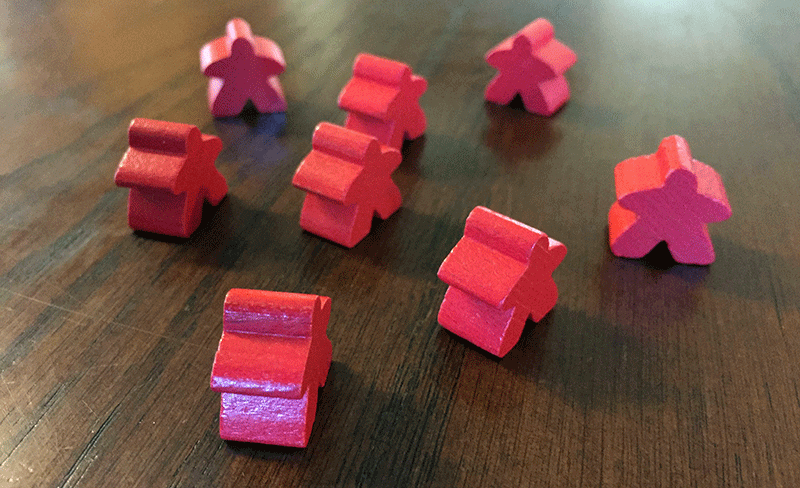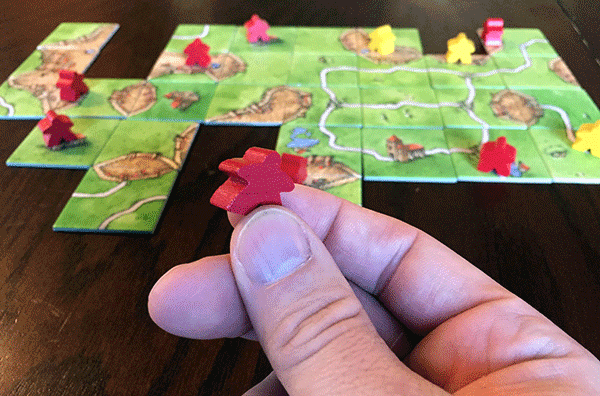
Life is uncertain. This isn’t news to anyone. Yet despite that uncertainty, we want to believe that life isn’t random. We want to believe that we have control of our destinies – that we hold our fate in our own hands. And we do! …sort of.
One of the challenges that we’ve had to overcome in our first five years of business is how to effectively strategize for the future, when so much of the future is uncertain. I frequently find myself shaking my head when I hear businesses talking about “five year plans” and “exit strategies” when none of us know what the next two months are going to bring. Am I missing something?
I don’t think so. Fortunately, games are here to help.
Strategy Games as Business
I don’t know about you, but I love strategy games. They’re fun, but they’re also a challenge that keeps you mentally sharp. If you’re paying attention, there are broader lessons that can be applied to other challenges in life, particularly business. One way that game developers try to keep games fun is by introducing elements of randomness into the game. In brief, this keeps the game fun by leveling the playing field slightly between more skilled or experienced players and less skilled or less experienced players. If the balance is right, everyone will get to win some of the time, but a better player will be satisfied that he or she wins more often. In other words, a good game is a mix of randomness and strategy.
Starting to see the connection yet?

One of my favorite table-top strategy games is Carcassonne, so for the purposes of this post, it will serve as a fine example. If you don’t know Carcassonne, I won’t try to explain the whole game right here, but here are the broad strokes:
- Each turn you play a board tile that develops the entire board.
- Each turn, you decide whether to play one of a limited number of Meeples (pawns) on the board to claim developing assets.
- You draw new board tiles to play from a random pool. No one knows how the board is going to develop.
- If you lay claim and hold onto resources that develop into completed structures (roads, castles, farms, etc…), you get bonus points and win the game.
There are lots of lessons that could be drawn from the game, but for now I’m going to focus on one aspect:

How do you win when everything about the future of the game in uncertain?
There are a couple of approaches that you might take (in a game or IRL), which I am going to call “planning” and “positioning”.
Planning
Planning is when you outline a series of steps in advance to lead you from A to B based on your projections of what the future holds.
Example: In the game Carcassonne, what would this look like? It would mean making decisions based on the assumption that I was going to draw the pieces I need to complete my structures and get my bonus points. You may put all your Meeples on the board eventually, but you prioritize a single investment at the expense of getting your other Meeples down. The downside is that, if I sink all my resources into completing one castle or road, and then I don’t draw the piece that closes the loop, that investment is essentially wasted.
It feels indelicate to say so, but I don’t see much difference between “plans” and “assumptions” (and we all know about assumptions). The more detail in your plan, most likely, the worse it is. More details just means more moving parts and more unknowns, which is more assumptions that have to be correct for you plan to be meaningful or accurate.
What happens when things don’t go “according to plan”?
Lots of plans fail. Anyone who has ever had to create an estimate or a timeline or a Gantt chart knows just how quickly those guesses fell out of step with reality.
I suspect that this is more true of small businesses than large businesses (larger sample sizes help smooth variance), but my experience has been that I never know when the peaks and valleys in business are going to come. This affects the entire sales pipeline and, in turn, the entire workflow of my business.
How could we do this better?

Positioning
We need to focus on developing strategies that are all about positioning ourselves to take advantage of an unknown future, instead of making plans that require assumptions about an unknown future to be true.
Example: In the game Carcassonne, what would this look like? Instead of assuming success in one venture, you would place your pieces to take advantage of the opportunities that arise. To start, you can’t hold your Meeples in your hand, you have to get them on the board. When an opportunity opens, you have to be aggressive and get in there and claim it before someone else does. Further, the more pieces you have on the board, the more likely that each tile you draw will be an opportunity for one of your developing assets. Each asset developed is usually smaller in scope, but more achievable. With each asset completed, you free up Meeples to devote to the acquisition of new assets. You still have to be careful not to overextend yourself (you don’t want to miss a key opportunity because you have no Meeples left to play), but you want to be as close to fully extended as is safely possible.
The same principles apply to business strategy. You don’t know which leads are going to close, so it’s wise to develop as many leads as you can. You won’t get any projects at all if you don’t put yourself in a position to claim them when they arise. You want to have a lot going, but don’t overcommit to so many projects that you have to pass the prefect opportunity when it arises. A great way to do this is to tackle manageable projects, and not bet everything on one mega-project that consumes all your bandwidth. Further, larger projects are harder to complete, and incur higher liability if you don’t complete them. Knowing you can (relatively) quickly complete a project also means you can complete one opportunity and free up resources to tackle a new prospect when it arises.
What Positioning Is and Is Not
I think a brief word of clarification is in order here: I am not recommending that we abandon strategy—far from it. I am specifically cautioning against the kind of strategy that equates to building castles in the sky: layer upon layer of extrapolations built on a foundation of assumptions.
Positioning is not passive. It is not “waiting for a break”. It is not reactionary.
Positioning should feel aggressive, relentlessly proactive. It’s about putting yourself in a position to succeed.
Positioning means taking initiative so that your pieces are down on the board. It means making sure that you see as many tiles as possible so that you get the one that fits a developed position. It means relentlessly pursuing opportunities and focusing on the things that you can control instead of including things that you can’t control in your plans. Then, once you’ve made commitments, focus on completing the objectives immediately in front of you, and make sure that you are still in a fluid enough position to adapt to changing conditions and take advantage of new opportunities.
Just because everything isn’t under our control doesn’t mean that strategy is futile.
Planning is poor strategy. Positioning is good strategy.
Don’t plan. Position.
Recommended Reading
Apologies to 37signals for stealing one of their talking points. Rework is a fabulous book, and their take on this was one of the most validating reads of my life.
I also drew heavily on the post “Estimation is Evil“. I read it a couple of years back and I still think about it almost every week.





